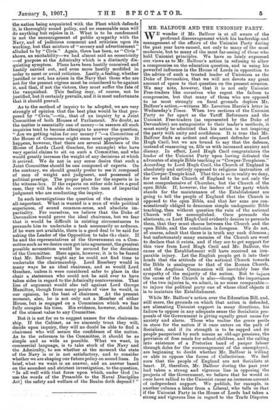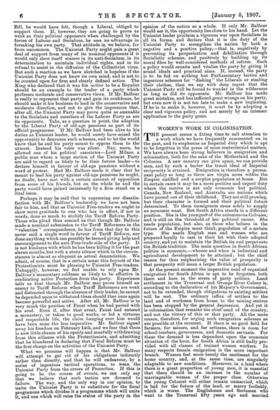MR. BALFOUR AND THE UNIONIST PARTY.
WE wonder if Mr. Balfour is at all aware of the profound discouragement which his leadership and management of the affairs of the Unionist Party during the past year have caused, not only to many of the most moderate, but to many of the most far-seeing of those who hold Unionist principles. We have so lately expressed our views as to Mr. Balfour's action in refusing to allow a compromise on the education question, and in using his powerful influence in the House of Lords in opposition to the advice of such a trusted leader of Unionism as the Duke of Devonshire, that we will not devote any great amount of space to that question on the present occasion. We may note, however, that it is not only Unionist Free-traders like ourselves who regret the failure to compromise, but that many 'of those who are opposed to us most strongly on fiscal grounds deplore Mr. Balfour's action,—witness Mr. Leverton Harris's letter in Wednesday's Times. When two sections of the Unionist Party so far apart as the Tariff Reformers and the Unionist Free-traders (as represented by the Duke of Devonshire) are antagonistic to their leader's methods, it must surely be admitted that his action is not inspiring the party with unity and confidence. It is true that Mr. Balfour finds an ardent and eloquent defender in Lord Hugh Cecil, but we are bound to say that the defence, instead of reassuring us, fills us with increased anxiety and dismay. In effect, Lord Hugh Cecil congratulates the leader of the Unionist Party upon having defeated the advocates of simple Bible teaching or "Cowper-Templeism." According to Lord Hugh Cecil, the Church of England is absolutely and entirely opposed to religious instruction of the Cowper-Temple kind. That this is so in reality we deny, for we hold the Church of England to be not only the most comprehensive of Churches, but the Church of the open Bible. If, however, the leaders of the party which stands for the maintenance of the Establishment are going to tell the people of England that the Church is opposed to the open Bible, and that her sons are con- scientiously obliged to denounce simple undogmatic Bible teaching, then without question the ruin of the national Church will be accomplished. Once persuade the electorate, as Lord Hugh Cecil evidently desires to persuade them, that they must choose between the Church and the open Bible, and the conclusion is foregone. We do not, of course, admit that there is in truth any such dilemma ; but unfortunately many enemies of the Church are wont to declare that it exists, and if they are to get support for this view from Lord Hugh Cecil and Mr. Balfour, the cause of the Establishment will have received an irre- parable injury. Let the English people get it into their heads that the attitude of the national Church towards the Bible is analogous to that of the Roman Church, and the Anglican Communion will inevitably lose the sympathy of the majority of the nation. But to injure the cause of the Church is also—though the importance of the two injuries is, we admit, in no sense comparable— to injure the political party one of whose chief objects it is to maintain the Establishment.
While Mr. Balfour's action over the Education Bill, and, still more, the grounds on which that action is defended, are alienating Unionist support in many directions, his failure to oppose in any adequate sense the Socialistic pro- posals of the Government is giving equally great cause for anxiety and alarm. Those who realise the grave perils in store for the nation if it once enters on the path of Socialism, and if its strength is to be sapped and its people pauperised by such means as old-age pensions, the provision of free meals for school-children, and the calling into existence of a Pretorian band of pauper labour through doles for the encouragement of the unemployed, are beginning to doubt whether Mr. Balfour is willing or able to oppose the forces of Collectivism. We feel sure that the people of England are not Socialists at heart. If, therefore, Mr. Balfour during the past year had taken a strong and vigorous line in opposing the projects of the Government, we believe that he would at once have rallied to the Unionist cause an immense amount of independent support. We publish, for example, in another column a letter from a Liberal, who tells us that if the Unionist Party in the House of Lords had taken a strong'and vigorous line in regard to the Trade Disputes
Bill, he would have felt, though a Liberal, obliged to support them. If, however, they are going to prove as weak as their political opponents when challenged by the forces of Labour and Socialism, he sees no advantage in forsaking his own party. That attitude is, we believe, far from uncommon. The Unionist Party might gain a great deal of support from many of its nominal opponents if it would only show itself sincere in its anti-Socialism, in its determination to maintain individual rights, and in its refusal to assist in the diffusion of the Collectivist virus. But such a reaction as we have sketched is hopeless if the Unionist Party does not know its own mind, and is not to be counted upon for firm and clearly defined action. The King who declared that it was his metier to be a Royalist should be an example to the leader of a party which professes moderate and conservative views. If Mr. Balfour is really to represent that party and gain its confidence, he should make it his business to lead in the conservative and moderate direction, and not to give the impression that, after all, the Unionist Party may prove quite as amenable to the Socialists and members of the Labour Party as are its opponents. Take, as a question in point, the adoption by the Liberal Party of old-age pensions as part of its official programme. If Mr. Balfour had been alive to his duties as Unionist leader, he would surely have seized the opportunity to denounce such schemes, and to let the world know that he and his party meant to oppose them to the utmost. Instead his voice was silent. Nay, more, he allowed one of his political associates—Lord Milner, a public man whom a large section of the Unionist Party are said to regard as likely to be their future leader—to declare himself in favour of old-age pensions without a word of protest. Had Mr. Balfour made it clear that he meant to lead his party against old-age pensions he might, no doubt, have met with a certain amount of opposition from some of his friends, but on the whole he and the party would have gained immensely by a firm stand on a vital issue.
Perhaps it may be said that in expressing our dissatis- faction with Mr. Balfour's leadership we have not been fair to him, and that as Unionist Free-traders we ought to show more gratitude to one who has in effect, if not in words, done so much to stultify the Tariff Reform Party. Those who plead thus remind us that though Mr. Balfour made a nominal submission to the Tariff Reformers in the " valentine " correspondence, he has from that day to this never said a single word in favour of Tariff Reform, nor done anything which can possibly be termed giving help and encouragement to the anti-Free-trade side of the party. It is not kindness with which he has been killing it for the past eleven months, but with a stony silence which in the circum- stances is almost as eloquent as actual denunciation. We admit, of course, that in a certain sense this boycott of the Protectionists must be pleasing to Unionist Free-traders. Unhappily, however, we feel unable to rely upon Mr. Balfour's momentary coldness as likely to be effective in eradicating active Protection from the party. Experience tells us that though Mr. Balfour may prove himself an enemy to Tariff Reform when Tariff Reformers are weak and distracted through the absence of their leader, he cannot be depended upon to withstand them should they once again become powerful and active. After all, Mr. Balfour is in very much the position of Faust when he had parted with his soul. Even if, after that event, Faust had entered a monastery, or taken to good works, or led a virtuous and respectable life, the claim hanging over him would have been none the less imperative. Mr. Balfour signed away his freedom on February 14th, and we fear that there is now little chance of his openly and manfully withdrawing from this alliance with the Protectionists, and admitting that lie blundered in declaring that Fiscal Reform must be the first charge on the activities of the Unionist Party.
What we presume will happen is that Mr. Balfour will attempt to get rid of his obligations indirectly rather than directly, and that he will endeavour, by a series of ingenious tactical operations, to wean the Unionist Party from the errors of Protection. If this is going to be the course of events, we can only say that we believe that such tactics are doomed to failure. The way, and the only way in our opinion, to unite the Unionist Party is to substitute for the fiscal programme which divides it a programme which will unite lty and one which will raise the status of the party in the
opinion of the nation as a whole. If only Mr. Balfour would see it, the opportunity lies close to his hand. Let the Unionist leader proclaim a vigorous war upon Socialism in all its forms, and declare that it is the duty of the Unionist Party to strengthen the nation by both a negative and a positive policy,—that is, negatively by preventing its pauperisation and debilitation through Socialistic schemes, and positively by building up its moral fibre by well-considered methods of reform. Such a policy would reunite and vitalise the party by giving it sound ideals and practical aims. If, instead, the party is to be fed on nothing but Parliamentary tactics and ingenious schemes for " dishing " the Liberals or stealing their clothes, then we say with deep regret that the Unionist Party will be forced to wander in the wilderness as long as did its opponents. Mr. Balfour has made great mistakes, and has inflicted great wrongs on his party, but even now it is not too late to make a new beginning. If he is to make it, however, it must be by adopting a clear and vigorous policy, and not merely by an intenser application to the party game.















































 Previous page
Previous page